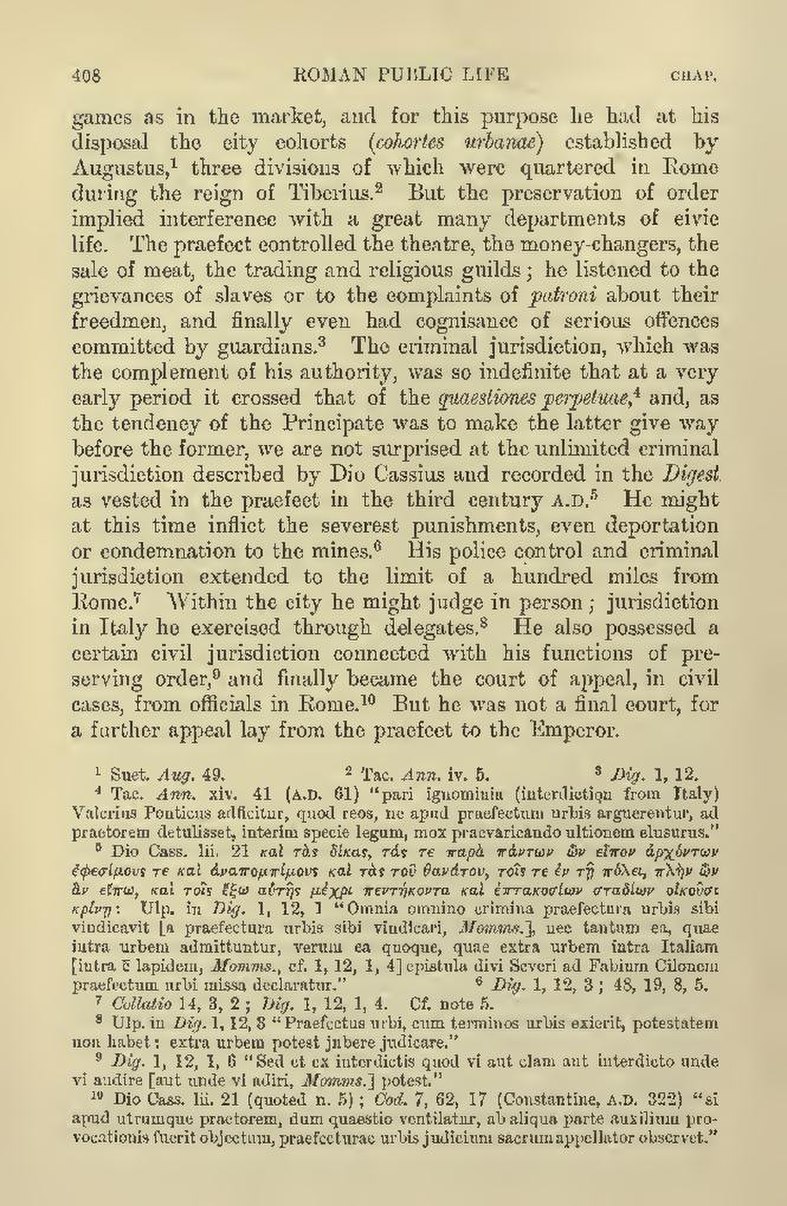games as in the market, and for this purpose he had at his disposal the city cohorts (cohortes urbanae) established by Augustus,[1] three divisions of which were quartered in Rome during the reign of Tiberius.[2] But the preservation of order implied interference with a great many departments of civic life. The praefect controlled the theatre, the money-changers, the sale of meat, the trading and religious guilds; he listened to the grievances of slaves, or to the complaints of patroni about their freedmen, and finally even had cognisance of serious offences committed by guardians.[3] The criminal jurisdiction, which was the complement of his authority, was so indefinite that at a very early period it crossed that of the quaestiones perpetuae,[4] and, as the tendency of the Principate was to make the latter give way before the former, we are not surprised at the unlimited criminal jurisdiction described by Dio Cassius and recorded in the Digest as vested in the praefect in the third century A.D.[5] He might at this time inflict the severest punishments, even deportation or condemnation to the mines.[6] His police control and criminal jurisdiction extended to the limit of a hundred miles from Rome.[7] Within the city he might judge in person; jurisdiction in Italy he exercised through delegates.[8] He also possessed a certain civil jurisdiction connected with his functions of preserving order,[9] and finally became the court of appeal, in civil cases, from officials in Rome.[10] But he was not a final court, for a further appeal lay from the praefect to the Emperor.: Ulp. in Dig. 1, 12, 1 "Omnia omnino crimina praefectura urbis sibi vindicavit [a praefectura urbis sibi vindicari, Momms.], nec tantum ea, quae intra urbem admittuntur, verum ea quoque, quae extra urbem intra Italiam [intra c̄ lapidem, Momms., cf. 1, 12, 1, 4] epistula divi Severi ad Fabium Cilonem praefectum urbi missa declaratur."]potest."]
- ↑ Suet. Aug. 49.
- ↑ Tac. Ann. iv. 5.
- ↑ Dig. 1, 12.
- ↑ Tac. Ann. xiv. 41 (A.D. 61) "pari ignominia (interdiction from Italy) Valerius Ponticus adficitur, quod reos, ne apud praefectum urbis arguerentur, ad praetorem detulisset, interim specie legum, mox praevaricando ultionem elusurus."
- ↑ Dio Cass. lii. 21 [Greek: kai tas dikas, tas te para pantôn hôn eipon archontôn ephesimous te kai anapompimous kai tas tou thanatou, tois te en tê polei, plên hôn an eipô, kai tois exô autês mechri pentêkonta kai heptakosiôn stadiôn oikousi krinê
- ↑ Dig. 1, 12, 3; 48, 19, 8, 5.
- ↑ Collatio 14, 3, 2; Dig. 1, 12, 1, 4. Cf. note 5.
- ↑ Ulp. in Dig. 1, 12, 3 "Praefectus urbi, cum terminos urbis exierit, potestatem non habet: extra urbem potest jubere judicare."
- ↑ Dig. 1, 12, 1, 6 "Sed et ex interdictis quod vi aut clam aut interdicto unde vi audire [aut unde vi adiri, Momms.
